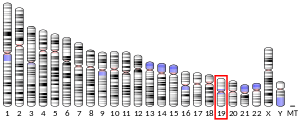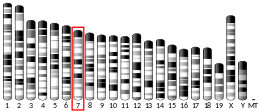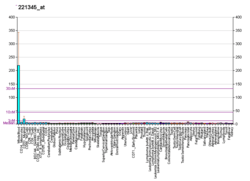Free fatty acid receptor 2
Free fatty acid receptor 2 (FFAR2) is a G-protein coupled receptor encoded by the FFAR2 gene.[5]
Expression
FFAR2 mRNA is expressed in adipose tissue, pancreas, spleen, lymph nodes, bone marrow, and peripheral blood mononuclear cells.[6][7] FFAR2 transcription is regulated by the XBP1 transcription factor which binds to the core promoter.[8]
Function
Mouse studies utilizing Ffar2 gene deletions have implicated the receptor in the regulation of energy metabolism and immune responses.[9] Short Chain Fatty Acids (SCFA's) generated in the processing of fiber by intestinal microbiota act as ligands for the receptor and can affect neutrophil chemotaxis.[10][11] However, discrepancies between the pathways activated by FFAR2 agonists in human cells and the equivalent murine counterparts have been observed.[12][13][14]
Heteromerization
FFAR2 may interact with FFAR3 to form a FFAR2-FFAR3 receptor heteromer with signalling that is distinct from the parent homomers.[15]
References
- GRCh38: Ensembl release 89: ENSG00000126262 - Ensembl, May 2017
- GRCm38: Ensembl release 89: ENSMUSG00000051314 - Ensembl, May 2017
- "Human PubMed Reference:". National Center for Biotechnology Information, U.S. National Library of Medicine.
- "Mouse PubMed Reference:". National Center for Biotechnology Information, U.S. National Library of Medicine.
- "Entrez Gene: FFAR2 free fatty acid receptor 2".
- Nilsson NE, Kotarsky K, Owman C, Olde B (April 2003). "Identification of a free fatty acid receptor, FFA2R, expressed on leukocytes and activated by short-chain fatty acids". Biochemical and Biophysical Research Communications. 303 (4): 1047–52. doi:10.1016/S0006-291X(03)00488-1. PMID 12684041.
- Le Poul E, Loison C, Struyf S, Springael JY, Lannoy V, Decobecq ME, et al. (July 2003). "Functional characterization of human receptors for short chain fatty acids and their role in polymorphonuclear cell activation". The Journal of Biological Chemistry. 278 (28): 25481–9. doi:10.1074/jbc.M301403200. PMID 12711604.
- Ang Z, Er JZ, Ding JL (January 2015). "The short-chain fatty acid receptor GPR43 is transcriptionally regulated by XBP1 in human monocytes". Scientific Reports. 5: 8134. doi:10.1038/srep08134. PMC 4311239. PMID 25633224.
- Bindels LB, Dewulf EM, Delzenne NM (April 2013). "GPR43/FFA2: physiopathological relevance and therapeutic prospects". Trends in Pharmacological Sciences. 34 (4): 226–32. doi:10.1016/j.tips.2013.02.002. PMID 23489932.
- Yang G, Chen S, Deng B, Tan C, Deng J, Zhu G, et al. (2018). "Implication of G Protein-Coupled Receptor 43 in Intestinal Inflammation: A Mini-Review". Frontiers in Immunology. 9: 1434. doi:10.3389/fimmu.2018.01434. PMC 6023978. PMID 29988393.
- D'Souza WN, Douangpanya J, Mu S, Jaeckel P, Zhang M, Maxwell JR, et al. (2017-07-20). "Differing roles for short chain fatty acids and GPR43 agonism in the regulation of intestinal barrier function and immune responses". PLOS ONE. 12 (7): e0180190. doi:10.1371/journal.pone.0180190. PMC 5519041. PMID 28727837.
- Dewulf EM, Ge Q, Bindels LB, Sohet FM, Cani PD, Brichard SM, Delzenne NM (January 2013). "Evaluation of the relationship between GPR43 and adiposity in human". Nutrition & Metabolism. 10 (1): 11. doi:10.1186/1743-7075-10-11. PMC 3577645. PMID 23327542.
- Priyadarshini M, Villa SR, Fuller M, Wicksteed B, Mackay CR, Alquier T, et al. (July 2015). "An Acetate-Specific GPCR, FFAR2, Regulates Insulin Secretion". Molecular Endocrinology. 29 (7): 1055–66. doi:10.1210/me.2015-1007. PMC 4484778. PMID 26075576.
- Ang Z, Er JZ, Tan NS, Lu J, Liou YC, Grosse J, Ding JL (September 2016). "Human and mouse monocytes display distinct signalling and cytokine profiles upon stimulation with FFAR2/FFAR3 short-chain fatty acid receptor agonists". Scientific Reports. 6: 34145. doi:10.1038/srep34145. PMC 5036191. PMID 27667443.
- Ang Z, Xiong D, Wu M, Ding JL (January 2018). "FFAR2-FFAR3 receptor heteromerization modulates short-chain fatty acid sensing". FASEB Journal. 32 (1): 289–303. doi:10.1096/fj.201700252RR. PMC 5731126. PMID 28883043.
Further reading
- Brown AJ, Jupe S, Briscoe CP (January 2005). "A family of fatty acid binding receptors". DNA and Cell Biology. 24 (1): 54–61. doi:10.1089/dna.2005.24.54. PMID 15684720.
- Sawzdargo M, George SR, Nguyen T, Xu S, Kolakowski LF, O'Dowd BF (October 1997). "A cluster of four novel human G protein-coupled receptor genes occurring in close proximity to CD22 gene on chromosome 19q13.1". Biochemical and Biophysical Research Communications. 239 (2): 543–7. doi:10.1006/bbrc.1997.7513. PMID 9344866.
- Senga T, Iwamoto S, Yoshida T, Yokota T, Adachi K, Azuma E, et al. (February 2003). "LSSIG is a novel murine leukocyte-specific GPCR that is induced by the activation of STAT3". Blood. 101 (3): 1185–7. doi:10.1182/blood-2002-06-1881. PMID 12393494.
- Brown AJ, Goldsworthy SM, Barnes AA, Eilert MM, Tcheang L, Daniels D, et al. (March 2003). "The Orphan G protein-coupled receptors GPR41 and GPR43 are activated by propionate and other short chain carboxylic acids". The Journal of Biological Chemistry. 278 (13): 11312–9. doi:10.1074/jbc.M211609200. PMID 12496283.
- Nilsson NE, Kotarsky K, Owman C, Olde B (April 2003). "Identification of a free fatty acid receptor, FFA2R, expressed on leukocytes and activated by short-chain fatty acids". Biochemical and Biophysical Research Communications. 303 (4): 1047–52. doi:10.1016/S0006-291X(03)00488-1. PMID 12684041.
- Le Poul E, Loison C, Struyf S, Springael JY, Lannoy V, Decobecq ME, et al. (July 2003). "Functional characterization of human receptors for short chain fatty acids and their role in polymorphonuclear cell activation". The Journal of Biological Chemistry. 278 (28): 25481–9. doi:10.1074/jbc.M301403200. PMID 12711604.
- Yonezawa T, Kobayashi Y, Obara Y (January 2007). "Short-chain fatty acids induce acute phosphorylation of the p38 mitogen-activated protein kinase/heat shock protein 27 pathway via GPR43 in the MCF-7 human breast cancer cell line". Cellular Signalling. 19 (1): 185–93. doi:10.1016/j.cellsig.2006.06.004. PMID 16887331.
External links
- "Free Fatty Acid Receptors: FFA2". IUPHAR Database of Receptors and Ion Channels. International Union of Basic and Clinical Pharmacology.




